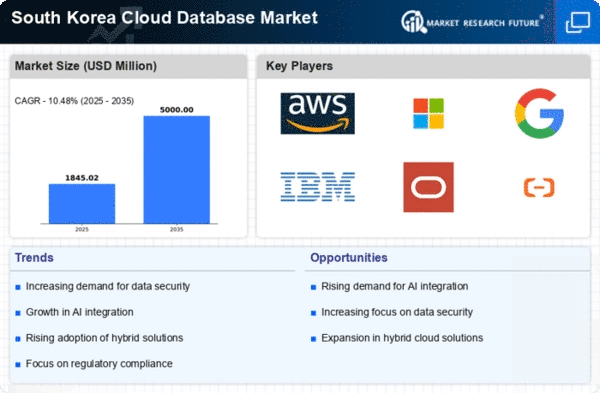Rising Demand for Scalable Solutions
The cloud database market in South Korea experiences a notable surge in demand for scalable solutions. As businesses expand, they require databases that can grow alongside their operations. This trend is particularly evident in sectors such as e-commerce and finance, where data volume increases rapidly. According to recent data, the market is projected to grow at a CAGR of 15% over the next five years. Companies are increasingly seeking cloud databases that offer flexibility and scalability, allowing them to manage large datasets efficiently. This rising demand for scalable solutions is a key driver in the cloud database market, as organizations prioritize agility and responsiveness to market changes.
Shift Towards Cost-Effective Data Management
Cost efficiency remains a critical driver in the cloud database market in South Korea. Organizations are increasingly recognizing the financial benefits of migrating to cloud-based solutions. By leveraging cloud databases, companies can reduce infrastructure costs and operational expenses. A recent analysis indicates that businesses can save up to 30% on IT costs by adopting cloud database solutions. This shift towards cost-effective data management is particularly appealing to small and medium-sized enterprises (SMEs) that seek to optimize their budgets while maintaining robust data capabilities. As a result, the cloud database market continues to expand, driven by the need for affordable and efficient data management solutions.
Growing Emphasis on Real-Time Data Processing
In the cloud database market, the emphasis on real-time data processing is becoming increasingly pronounced. Organizations in South Korea are recognizing the importance of accessing and analyzing data in real-time to make informed decisions. This trend is particularly relevant in industries such as finance and telecommunications, where timely data insights can lead to competitive advantages. The market for real-time data processing solutions is expected to grow significantly, with projections indicating a potential increase of 20% in demand over the next few years. This growing emphasis on real-time capabilities is a vital driver for the cloud database market, as businesses seek to enhance their operational efficiency and responsiveness.
Emergence of Industry-Specific Cloud Solutions
The emergence of industry-specific cloud solutions is shaping the cloud database market in South Korea. As various sectors face unique challenges, tailored cloud database solutions are becoming increasingly popular. Industries such as healthcare, finance, and manufacturing are seeking specialized databases that cater to their specific regulatory and operational needs. This trend is reflected in the growing number of vendors offering customized cloud database solutions. Market analysis indicates that the demand for industry-specific cloud databases could grow by 18% over the next few years. This emergence of tailored solutions is a key driver in the cloud database market, as organizations seek to optimize their data management strategies.
Increased Focus on Data Analytics Capabilities
The cloud database market in South Korea is witnessing an increased focus on advanced data analytics capabilities. Organizations are increasingly leveraging cloud databases to harness the power of big data analytics, enabling them to derive actionable insights from vast amounts of information. This trend is particularly relevant in sectors such as retail and healthcare, where data-driven decision-making is crucial. Recent statistics suggest that the demand for analytics-driven cloud database solutions is expected to rise by 25% in the coming years. This increased focus on data analytics capabilities serves as a significant driver for the cloud database market, as businesses strive to enhance their competitive edge through informed decision-making.
















